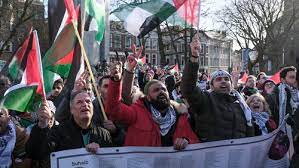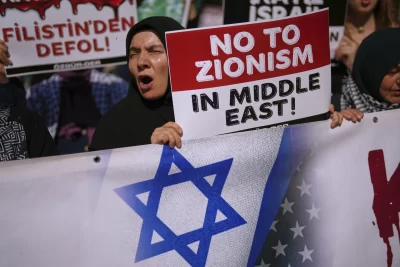
THE HAGUE, Netherlands— The United Nations’ top court on Friday ordered Israel to do all it can to prevent death, destruction and any acts of genocide in Gaza, but the panel stopped short of ordering Jerusalem to end the military offensive that has laid waste to the Palestinian enclave.
In a ruling that will keep Israel under the legal lens for years to come, the court offered little other comfort to Israel in a genocide case brought by South Africa that goes to the core of one of the world’s most intractable conflicts. The court’s half-dozen orders will be difficult to achieve without some sort of cease-fire or pause in the fighting.
“The court is acutely aware of the extent of the human tragedy that is unfolding in the region and is deeply concerned about the continuing loss of life and human suffering,” said court President Joan E. Donoghue.
The ruling amounted to an overwhelming rebuke of Israel’s wartime conduct and added to mounting international pressure to halt the nearly 4-month-old offensive, which has killed more than 26,000 Palestinians, decimated vast swaths of Gaza and driven nearly 85% of its 2.3 million people from their homes.
Allowing the accusations to stand stung the government of Israel, which was founded as a Jewish state after the Nazi slaughter of 6 million Jews during World War II.
Israeli Prime Minister Benjamin Netanyahu said the fact that the court was willing to discuss the genocide charges was a “mark of shame that will not be erased for generations.” He also vowed to press ahead with the war.
The power of the ruling was magnified by its timing, coming on the eve of International Holocaust Remembrance Day.
“Those truly needing to stand trial are those that murdered and kidnapped children, women and the elderly,” former Israeli Defense Minister Benny Gantz said, referring to Hamas militants who stormed through Israeli communities on Oct. 7 in the attack that set off the war. The assault killed some 1,200 people and resulted in another 250 being kidnapped.
The court also called on Hamas to release the hostages who are still in captivity.
Haim Abraham, a lecturer in laws at University College London, noted that the court decision indicated “that there is, on the face of things, a risk that genocide might have been conducted” by Israel.
Many of the measures were approved by an overwhelming majority of the judges. Of the six orders, an Israeli judge voted in favor of two — an order for humanitarian aid and another for the prevention of inflammatory speech.
Israeli Judge Aharon Barak said he voted for those orders in the hope that they would “help to decrease tensions and discourage damaging rhetoric” while easing the ”consequences of the armed conflict for the most vulnerable.”
Such provisional measures issued by the world court are legally binding, but it is not clear if Israel will comply with them.
“We will continue to do what is necessary to defend our country and defend our people,” Netanyahu said. “Like every country, Israel has the basic right to defend itself.”
The court ruled that Israel must do all it can to prevent genocide, including refraining from killing Palestinians or causing harm to them. It also ruled that Israel urgently needs to get basic aid to people in Gaza and that the country should prevent and punish any incitement to genocide, among other measures.
The court told Israel to submit a report on measures taken within a month.
“That’s a time that the court could come back and say, ‘You have not met the orders. You have not complied. Now we find you are in the midst of committing genocide, and you must cease fire,’” said Mary Ellen O’Connell, a professor of law and international peace studies at Notre Dame University’s Kroc Institute.
Friday’s decision was an interim ruling. It could take years for the court to consider all aspects of South Africa’s genocide allegations.
Palestinian Foreign Minister Riyad al-Maliki welcomed the U.N. decision and said the judges “ruled in favor of humanity and international law.”
The South African government said the ruling had determined that “Israel’s actions in Gaza are plausibly genocidal.”
“There is no credible basis for Israel to continue to claim that its military actions are in full compliance with international law, including the Genocide Convention, having regard to the Court’s ruling,” the government said in a statement.
Israel often boycotts international tribunals and U.N. investigations, saying they are unfair and biased. But this time, it took the rare step of sending a high-level legal team — a sign of how seriously it regards the case.
The Health Ministry in the Hamas-run territory does not differentiate between combatants and civilians in its death toll, but the agency has said about two-thirds of those killed have been women and children.
The Israeli military claims at least 9,000 of the more than 26,000 dead were Hamas militants.
U.N. officials have expressed fears that even more people could die from disease and malnutrition, with at least one-quarter of the Gaza population facing starvation.
The U.S. has said Israel has the right to defend itself but also spoken about the need for the country to protect civilians and allow more aid in.
Friday’s ruling may have sowed more division than reconciliation, but Balkees Jarrah, associate international justice director at Human Rights Watch, said at least one thing was clear.



